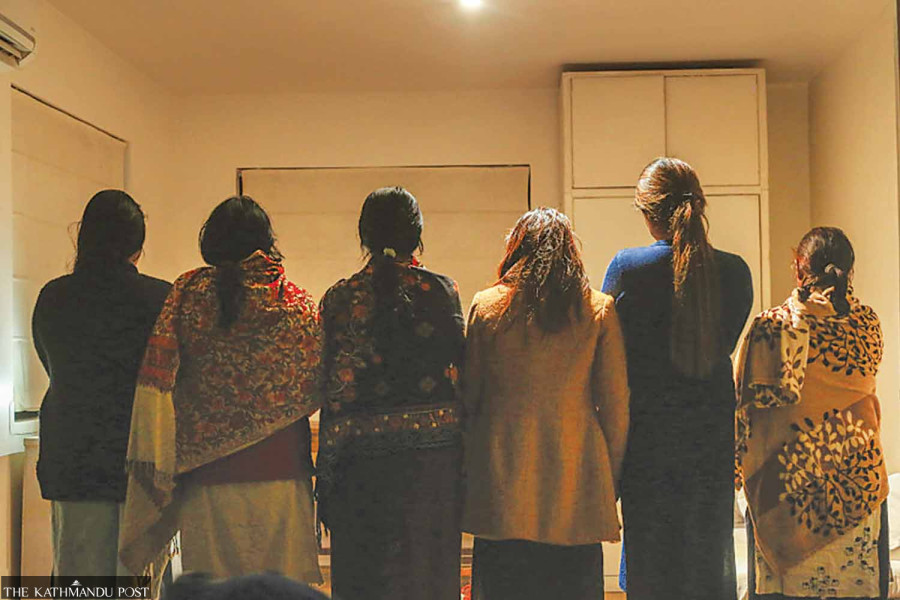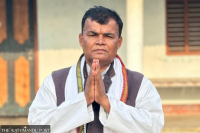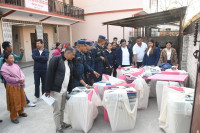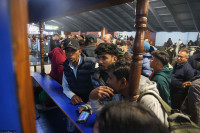National
Conflict-era victims of sexual violence still ignored
They have not been listed as recipients of interim relief available to victims of other insurgency-era crimes.
Binod Ghimire
‘Rolpa A’, her real identity withheld to maintain privacy, was hardly 13 when security personnel came to her house in Rolpa district to take her. They accused her of being a Maoist cadre, even though she had no connection with the insurgents.
She was blindfolded, her wrists tied behind her back, and taken to the nearest Royal Nepal Army barracks. She was tortured, sexually assaulted and raped on December 6, 2001.
“I was left blindfolded for months on cold cement floors. The army men would kick, inflict electric shocks, pierce me with pins and nails and even dip [my body] in chilling water in winter. They would molest and even rape me,” Rolpa A shared her horrific story with the Post. “They tortured me in every possible way, demanding I reveal the names of Maoist cadres, whose associate I wasn’t.”
The following two years were hell. There was not a single day when she was not tortured. She was taken to different army barracks in Dang and Nepalgunj in the name of interrogation. Rolpa A was freed as a captive in late 2003, following peace negotiations between the government and the Maoist party. By then she had already faced severe consequences.
As a result of multiple rapes over the years, she suffers unbearable pain and excessive bleeding during periods. The indiscriminate beating and torture have left her with complex neurological problems. She often gets severe headaches and is disoriented. She has lived this traumatic life for 19 years, without proper treatment.
“After diagnosis, doctors have advised a uterus removal before my case gets too complicated,” she said, adding that she cannot afford the treatment. “There is nobody to help.”
Over the years, survivors of conflict-related sexual violence (CRSV) have been the most neglected by the state. They have not been listed as interim relief recipients, exposing them to systemic discrimination.
Successive federal governments in the post-Comprehensive Peace Accord period have rolled out different monetary and other support programmes to other victims of the decade-long Maoist conflict, but CRSV and torture survivors have been left in the lurch.
With the country transitioning into federalism, provincial governments and local units have also devised relief programmes for conflict victims, which too are indifferent to the plight of CSRV victims.
Whenever they seek some support, they are asked to recount how they were victimised and even provide proof of it.
Most survivors have hidden their past, even from their families. There is a fear of rejection by the husband and in-laws while the social stigma persists. However, no governments from the federal to the local level have tried to understand the gravity of the matter.
“My husband abandoned me after knowing that I am an insurgency-era rape survivor. It took him years to realise that it was not my fault before he agreed to patch up,” said Kailali A, a victim of rape and torture at the hands of state security forces from Kailali district. “I cannot reveal my reality due to the social stigma. As a result, I have yet to get any kind of state support.”
Those speaking for CSRV survivors say their misery compounds due to the lack of government attention. They await physical and mental checkups, and need support for their children’s studies and the means of income generation. Due to prolonged rape and unsafe forceful abortion during the insurgency, such victims have developed serious health complications and post-traumatic stress disorder.
“I need support to get up from the toilet pan because of the pain in my hip bones. Even today, the torture in the army camps traumatises me,” said Kailali A. “However, except for some help with checkup provided by some organisations, I have not received any support.”
Rights advocates say all tiers of government must be sensitive to the suffering of the CRSV survivors. “There must be an overarching policy for the support and a mechanism to ensure confidentiality to address their reparative needs,” said Mandira Sharma, senior international legal adviser to the International Commission of Jurists (ICJ).
Records at the Truth and Reconciliation Commission show that among the 63,700 insurgency-era cases it received, just 314 are related to rape or sexual violence. As most of such victims were not assured of confidentiality, they refrained from filing their complaints.
Sharma believes the number of CRSV survivors is in the thousands. “We started a focused programme in the Lumbini Province, anticipating their number would be around 500, but it was several times higher. This is the case in other provinces as well,” she said.
After a study of the situation of CRSV recently, the ICJ has said there has been a failure to maintain confidentiality and sensitivity in processes related to data collection, identification, and restitution of victims of rape and gender-based violence.
Due to the lack of guaranteed privacy and gender-sensitive methods and procedures, victims of sexual violence are unable to come forward to register complaints and claim compensation, it said.
Stating that no special programmes have been implemented to address the needs of these victims and affected groups, it said: “As an initial package of restitution, the state should have provided immediate interim relief to victims of rape, sexual violence, and torture, just as it has done for other victims. Even after the end of the conflict, victims of rape and sexual violence have continued to experience further suffering due to the state's discriminatory treatment.”
The victims say the state should fulfil their reparative needs first. “However, that alone is not enough. We must be compensated for being deprived of study, for the mental trauma that keeps haunting us even today and ruined social life,” said ‘Dailekh A’, another CRSV survivor. “After that, the perpetrators must be penalised for their crimes. Only then will justice be served.”




 23.27°C Kathmandu
23.27°C Kathmandu















